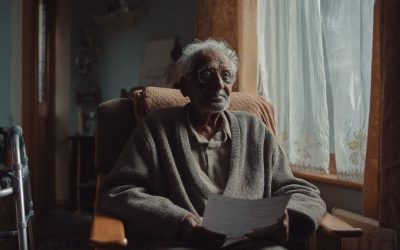In the UK, an estimated 141,000 kinship carers—relatives or close friends raising children unable to live with their parents—often navigate their roles with limited support. Unlike foster carers, kinship carers frequently lack access to financial assistance, training, and respite services. A recent report by a charity highlights that these caregivers are twice as likely to rely on food banks and four times more likely to fall behind on bills compared to other adults, underscoring the urgent need for comprehensive support systems.
There are times when life doesn’t just pile on—it overwhelms. That’s where Peter Henshaw (name changed) found himself when he walked into his local surgery, carrying far more than any man should have to bear alone.
Recently, Peter had taken his grandson into his care. The boy arrived with barely any clothing, no belongings, and without any benefits in place. At the same time, Peter’s wife was undergoing cancer treatment, and Peter, quietly, was trying to hold everyone together. What wasn’t obvious—until he began to speak—was that Peter was also carrying trauma from the past, still raw and unresolved.
Social prescriber Laura Henvey met with Peter face-to-face. During their conversation, the true extent of the emotional and financial pressure became clear. Peter was tearful, frustrated, and hesitant to talk about himself—he kept the focus on his family. But Laura gently encouraged him to consider his own wellbeing too.
She wasted no time in mobilising support.
Peter was referred to Be There 4 U for a full benefits check and application help, including support around a previously failed PIP application. For his grandson, Laura applied to the Children in Need Emergency Essentials Scheme, successfully securing a clothing voucher and kitchen bundle—including a slow cooker and air fryer—to support the family’s day-to-day living. She also contacted Rubery Swap Shop, where Peter later collected a complete school uniform bundle, easing his worry about the new term ahead.
Fuel vouchers were provided to help with the rising cost of living. A food bank voucher was offered, though Peter declined.
To ensure lasting support, Laura referred Peter to Early Help services and St. Germain’s for 1:1 emotional wellbeing support—an offer Peter had initially resisted but ultimately accepted. A referral to Birmingham Carers Hub ensured he’d have access to ongoing help in his new dual role as carer and guardian. Laura also signposted him to Macmillan Nurses for his wife’s cancer support.
Progress followed. With tangible help arriving and someone finally on his side, Peter began to open up. At a recent follow-up, he looked visibly more relaxed, even hopeful.
“He no longer feels alone,” Laura noted.
Peter’s situation is still complex. But now, he’s not navigating it in silence—and that alone changes everything.
Peter’s journey underscores the critical need for comprehensive support systems for kinship carers. By connecting with relevant services, individuals like Peter can find the strength and resources needed to care for their loved ones while also attending to their own wellbeing.

CHALLENGES AT A GLANCE
- Financial Pressure
- Kinship Care
- Cancer Support
- Past Trauma
- Emotional Strain




0 Comments